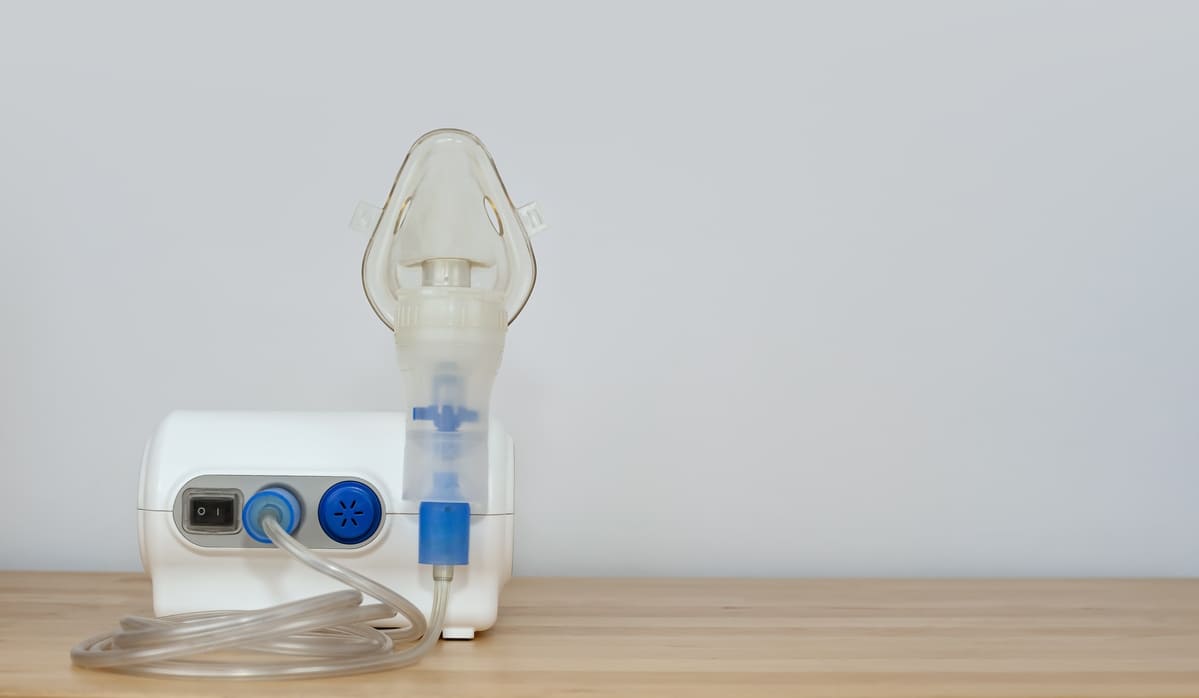Stepping into the world of respiratory health can seem like a labyrinth, with questions about nebulizers at every turn. It’s natural to have questions about this essential medical device, especially if you or a loved one relies on it for breathing treatments. To help navigate through the confusion, we’ve compiled some of the most frequently asked questions about nebulizers. This article is your ultimate resource for understanding nebulizers, from enhancing medication absorption to the science behind these medical devices. Whether you’re new to nebulizers or an experienced user, we’ve got you covered!
QUES 1: What is the purpose of a nebulizer?
Ans: A nebulizer is a medical device designed to administer medication in the form of a mist that can be easily inhaled into the lungs. This method is particularly beneficial for delivering respiratory medications to patients who may have difficulty using inhalers, such as children or elderly individuals. Nebulizers are often used for the treatment of conditions like asthma, COPD, or other respiratory diseases, enabling effective delivery of medication directly to the respiratory tract for faster relief and improved lung function.
QUES 2: How many days can you use a nebulizer?
Ans: The usage schedule for a nebulizer can vary based on the medical condition and the doctor’s instructions. As an example, you might be advised to use the nebulizer four times a day at 4-hour intervals for the first 2 days. Following this, the frequency could be reduced to every 6 hours for 2 more days, then further decreased to every eight hours for another 2 days. Lastly, you might be instructed to administer the treatment just twice daily, in the morning and evening, for the final two days.
QUES 3: Is a nebulizer good for daily use?
Ans: Yes, a nebulizer can be used daily, especially for managing chronic respiratory conditions like asthma or COPD. It delivers medication directly to the lungs, providing effective relief from symptoms. However, the frequency and duration of its use should be as per your healthcare provider’s instructions.
QUES 4: What are the disadvantages of a nebulizer?
Ans: While nebulizers can be highly effective in delivering medication to the respiratory tract, there are some potential disadvantages to using them. These include:
- Time-consuming: Nebulizers require more time to administer medication compared to inhalers.
- Lower pulmonary deposition: A small percentage of the medication may be deposited in the mouth or throat, rather than reaching the lungs.
- Noise and vibration: Some nebulizer models can be loud and produce vibrations during use, which may cause discomfort for some individuals.
- Cost: Nebulizers can be more expensive than inhalers, and the cost may increase if used frequently for a long time.
QUES 5: Are there any side effects of the nebulizer?
Ans: As with any medication, there is a potential for side effects when using a nebulizer. However, the risk of side effects is generally low, and most individuals experience no adverse reactions. Some possible side effects that may occur include:
- Throat irritation: The mist from the nebulizer may cause throat irritation or dryness in some people.
- Increased heart rate: In rare cases, nebulized medication may cause an increased heart rate or palpitations.
- Tremors: Some individuals may experience tremors in the hands or fingers after using a nebulizer, which typically subsides within a few minutes.
- Difficulty in breathing: In rare cases, nebulized medication may cause difficulty in breathing or shortness of breath. If this occurs, seek immediate medical attention.
QUES 6: Is a nebulizer good for dry cough?
Ans: Yes, a nebulizer can be effective for treating a dry cough. It works by converting medications into smaller particles that can easily penetrate the lungs, providing relief from cough and other respiratory symptoms. Nebulizers are particularly useful for individuals, including children and adults, who have difficulty using traditional inhalers.
QUES 7: Is a nebulizer safe for the lungs?
Ans: Yes, a nebulizer is safe for the lungs. In fact, it can be quite beneficial for respiratory health. It aids in reducing lung inflammation and opening up the airways, which is particularly helpful in managing conditions like asthma.
QUES 8: Can I drink water after the nebulizer?
Ans: Post-nebulization, it’s generally recommended to wait before consuming food or drink. Specifically, if you’re using nebulized lidocaine, it’s advisable to refrain from eating or drinking for at least an hour to ensure the medication’s full effect. Always follow your healthcare provider’s instructions.
QUES 9: Can we use a nebulizer for a blocked nose?
Ans: Yes, a nebulizer can be used for a blocked nose. A specific type of this device, known as a nasal nebulizer, is often employed by individuals suffering from sinusitis and allergies. It delivers moisture, cleansing solutions, and both over-the-counter and prescription medications directly to the congested and infected areas within the sinuses. This can effectively alleviate symptoms of nasal blockage.
QUES 10: Which liquid is used in a nebulizer for cough?
Ans: For treating cough, a nebulizer often uses a liquid medication known as Albuterol, specifically in its sulfate form (AccuNeb). Albuterol is a bronchodilator drug that expands the airways, making breathing easier for individuals experiencing bronchospasm or airway constriction. The nebulizer converts this liquid medication into a fine mist that can be easily inhaled directly into the lungs for quick relief.
QUES 11: Which Nebulisation is best for cough?
Ans: Several medications can be used in a nebulizer for cough relief, including Albuterol, hypertonic saline, formoterol, budesonide, and ipratropium. Albuterol is a bronchodilator that helps to open the airways, while hypertonic saline acts as a mucus thinner. It’s important to note that the best nebulization treatment for cough depends on the individual’s specific condition and should be determined by a healthcare professional.
QUES 12: Can we put Vicks in a nebulizer?
Ans: No, it is not recommended to put Vicks or any other essential oils in a nebulizer as they are not designed to handle such substances. However, inhalation of these oils can irritate and potentially harm the lungs. It’s best to use only prescribed medications for nebulization treatments. Some common medications used in a nebulizer for cough include bronchodilators, corticosteroids, and mucolytics. Always consult your doctor for the best nebulization treatment for a cough or any respiratory condition.
QUES 13: Can I Nebulize with boiled water?
Ans: Yes, it is possible to use a nebulizer with water alone. However, it’s crucial that the water is boiled and then allowed to cool before use. This ensures the water is sterilized and safe for inhalation. Always consult with a healthcare provider before starting any new treatment regimen or changing your existing one.
QUES 14: What not to do after nebulizing?
Ans: After nebulizing, it’s essential to clean and disinfect the nebulizer according to the manufacturer’s instructions. This helps prevent contamination and potential infections. However, avoid sharing your nebulizer with others to prevent the transmission of viruses or bacteria. It’s also advisable not to smoke or be in smoky environments while using a nebulizer, as this can irritate the lungs and diminish the medication’s effectiveness. Overall, it’s important to prioritize good hygiene practices and avoid potential irritants after nebulizing for optimal treatment results.
QUES 15: Can more than one person use the same nebulizer?
Ans: It’s generally not recommended for more than one person to use the same nebulizer, as this can increase the risk of cross-contamination and spread of infections. However, if necessary, specific guidelines should be followed to ensure proper disinfection and cleaning between uses. This includes thoroughly washing all parts with soap and water after each use and using a recommended disinfectant solution or boiling the parts for proper sterilization. Always consult with your healthcare provider before sharing a nebulizer between individuals.
QUES 16: How long should nebulizing take?
Ans: The duration of a nebulizing session varies, typically ranging from 5 to 20 minutes. This depends on both the device and the type of medicine being used. The procedure involves breathing through your mouth until all the medication is consumed.
QUES 17: When should I stop using a nebulizer?
Ans: As for when to stop using a nebulizer, you should continue the treatment until the medication is depleted. The device will make a sputtering sound, and only a small amount of liquid will remain in the cup. However, if you start feeling dizzy or overly stimulated, pause the treatment and rest for approximately 5 minutes before resuming. Always remember to breathe slowly during the process.










![Home Renovation Guide [2025]](/app/uploads/2021/04/design-hacks-1-378x300.jpg)
